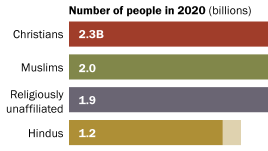
Many Religious ‘Nones’ Around the World Hold Spiritual Beliefs
Despite their nonreligious identity, many unaffiliated adults hold spiritual or religious beliefs. About a fifth or more in 22 countries believe in an afterlife, for example.
Numbers, Facts and Trends Shaping Your World
Despite their nonreligious identity, many unaffiliated adults hold spiritual or religious beliefs. About a fifth or more in 22 countries believe in an afterlife, for example.
All
Publications
Over the past few years, there have been several controversies over religion’s role in the military. Most recently, students and staff at the U.S. Naval Academy and West Point have complained of pressure from their supervisors to engage in religious activities. Three years earlier, there were similar allegations at the U.S. Air Force Academy. Other […]
Washington, D.C. In a noon conference call for journalists, Luis Lugo, director of the Pew Forum on Religion & Public Life, together with fellows John Green and Greg Smith, released the second report of the Forum’s path-breaking U.S. Religious Landscape Survey – along with new data added to the interactive website accompanying the project – […]
Washington, D.C. In the Hein v. Freedom From Religion Foundation decision in June 2007, the U.S. Supreme Court made it more difficult for courts to enforce the Establishment Clause’s restrictions on government funding of religion. In Hein, the high court ruled that unless a legislative body has specifically directed funding to a religious organization or […]
In 2003, the Episcopal Church, USA, ordained a gay bishop, igniting an intense debate within the church over its views on homosexuality. Some local congregations that opposed the ordination voted to break away from the national denomination, leading to complicated legal disputes over the ownership of church property. There have been a number of similar […]
(Updated Aug. 13, 2008) In Hein v. Freedom From Religion Foundation (2007), the U.S. Supreme Court limited the power of federal courts to enforce the Establishment Clause’s restrictions on government funding of religion. In Hein, the high court ruled that unless a legislative body has directly authorized such funding, citizens do not have the right […]
Liberal and progressive religious voices have become increasingly prominent in the 2008 presidential campaign. To complement a recent Forum-sponsored panel discussion on the “religious left,” Associate Director Mark O’Keefe asked Senior Fellow John Green to define the various groups that make up the religious left movement and talk about implications for the “religious right.” Featuring: […]
A major survey confirms the close link between Americans’ religious affiliation, beliefs and practices, on the one hand, and their social and political attitudes, on the other. The social and political fault lines in American society run through, as well as alongside, religious traditions.
Christians remain the largest religious group, and Muslims grew the fastest from 2010 to 2020. Read how the global share of Buddhists, Hindus, Jews and the religiously unaffiliated changed.
Most who use astrology (or a horoscope), tarot cards or a fortune teller say they do so just for fun rather than for insights about life.
After years of decline, the U.S. Christian share now shows signs of leveling off. The new Religious Landscape Study explores trends in identity, beliefs and practices.
The Global Religious Futures (GRF) project is jointly funded by The Pew Charitable Trusts and The John Templeton Foundation. Here are some big-picture findings from the GRF, together with context from other Pew Research Center studies.




